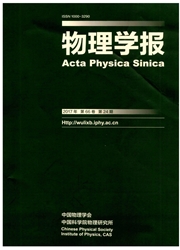

 中文摘要:
中文摘要:
对颗粒物质的有效质量谱及耗散功率进行了数值研究,发现水平和垂直激励下颗粒体系的共振频率f_g与体积模量k均随压强P呈分段幂律变化,在高压强下遵循fg∝P^1/6,k∝P^1/3的规律,在低压强下遵循fg∝P^1/4,k∝P^1/2的规律.同时,在水平和垂直振动下,颗粒体系品质因子的倒数1/Q随P的变化呈指数衰减.在特定频率和压强下,颗粒体系的平均耗散功率p随振动强度Γ的变化曲线上存在一个特征振动强度Γ*,当Γ〈Γ*时,颗粒体系表现出类固态行为,平均耗散功率p随振动强度Γ呈幂律标度,p∝Γ-α(2〈α〈5);当Γ〉Γ*时,颗粒体系表现出类液态行为,体系的平均耗散功率p随振动强度Γ呈线性变化.由此得到了水平激励下颗粒体系类固体类流体转变的Γ-P相图.
 英文摘要:
英文摘要:
In this paper, in order to explore the movement characteristics of granular system under the horizontal and vertical excitation, the effective mass spectrum and dissipation power of granular material are studied by numerical simulation.We use LIGGGHTS software to simulate a granular system consisting of 13340 dispersed particles in a cubic container.For the two different vibration directions of granular system(horizontal and vertical), we carry out a pressure unloading experiment in a pressure range from 1012.10 k Pa to 8.66 k Pa. It is found that under the horizontal and vertical excitation,the resonance frequency fg and volume modulus k of granular system satisfy piecewise power-law with the change of pressure P applied to the top surface. It follows the laws, that is, fg ∝ P^1/6and k ∝ P^1/3at low pressure and fg ∝ P^1/4and k ∝ P^1/2at high pressure. At the same time, according to the effective mass of the imaginary part, we can obtain the dissipative characteristics of the granular system. Under the horizontal and vertical excitation, the reciprocal of quality factor of granular matter, 1/Q, decreases exponentially with the change of pressure P. In the relaxation dynamics of the granular system, both the acceleration and the stress play a role similar to the role of temperature in the thermal system. In order to further study the influence of acceleration on solid-fluid-like transition of granular system, we measure the relationships between the dissipation power and the vibration intensity(1g–30g) under different pressures(8.66–1012.10 kPa), in the horizontal vibration(500 Hz). At the fixed frequency and pressure, there is a characteristic vibration intensity Γ*in the curve of the average power dissipation of granular system with vibration intensity Γ. WhenΓ〈 Γ*, the granular system exhibits a solid-like behavior, and the variation of the average power dissipation with the change of vibration intensity Γ shows a power-law scaling, p ∝ Γ-α(2 〈α 〈5); when Γ
 同期刊论文项目
同期刊论文项目
 同项目期刊论文
同项目期刊论文
 期刊信息
期刊信息
